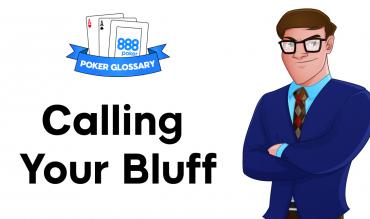The term call your bluff implies that we suspected our opponent was bluffing and correctly made the call. The expression call your bluff is also used outside of poker in day to day speech. It carries the idea of challenging someone to carry out their stated intention, not believing that they will really follow through.
In this guide we’ll learn the following -
- When should you call your opponent’s bluff in poker?
- bluffcatch in poker?">When is it correct to bluffcatch in poker?
- What does it mean to call someone’s bluff in the English language?
- How can I tell if my opponent is bluffing in poker?
- Which factors increase the likelihood my opponent is bluffing in Hold’em?
- What should I do if my opponent calls my bluff?
When Should You Call Your Opponent’s Bluff in Poker?
If we know our opponent is bluffing with a worse holding, we should call every time! But that is not usually how it works in practice. Usually, we suspect our opponent might be bluffing but do not know for certain. It then becomes more of a math problem – is our opponent bluffing frequently enough to justify the amount of chips we would be investing on a call?
When is it Correct to Bluffcatch in Poker?
The theoretical answer is that we need to win more frequently than our pot odds expressed as a percentage. For example, if our opponent bets half pot on the river, we are getting 25% (3:1) pot odds. If we suspect our opponent is bluffing more than 25% of the time, then we have a profitable call with our bluffcatcher.
What Does it Mean to ‘Call Someone’s Bluff’ in English?
Although the phrase ‘call your bluff’ started with poker, it is often used outside of poker. It means to challenge someone to actually do what they are saying, because we don’t believe they will. ‘He threatened to phone the cops if I didn’t turn the music down, but I called his bluff and left the music up loud’.
How Can I Tell if My Opponent is Bluffing in Poker?
Sometimes a physical tell (such as a nervous twitch) might give away the fact that our opponent is bluffing, but in most cases, we will never know 100% if our opponent is bluffing. Good players tend towards thinking in terms of frequencies i.e. I think my opponent is bluffing around 25% of the time in this situation.
Which Factors Make It More Likely My Opponent is Bluffing in Hold’em?
It is usually more likely our opponent is bluffing on board textures where there are lots of missed draws. It is also more likely our opponent is bluffing when he bets over streets. For example, a player is less likely to be bluffing when he bets all three streets compared to just betting the turn and river after the flop gets checked through. A final thing to check is bet-sizing, half pot sizings are usually more bluff-heavy while pot-sized bets indicate strength.
What Should I do if My Opponent Calls My Bluff?
It depends on how wide our opponent calls. If his holding is relatively strong there is still a good chance our bluff will be profitable in the future since he is potentially folding the weaker hands. If, on the other hand, our opponent calls us with a really weak holding, perhaps with bottom pair or Ace-high, we might want to think about cutting out bluffs against that opponent in the future.
Summary
Why not check out the section on bluffcatching from the 888 ultimate bluff guide? You’ll pick up some tips on how to more accurately call your opponent’s bluffs in the future.


